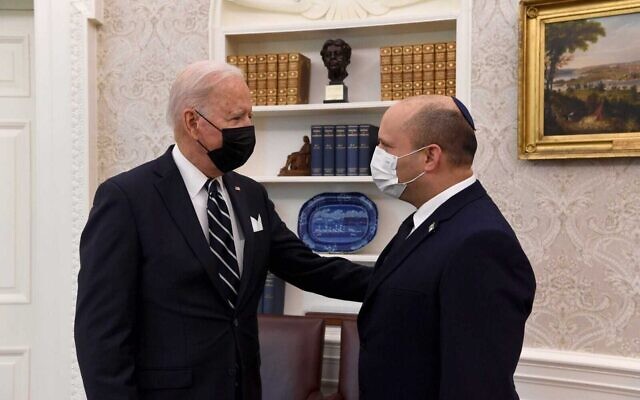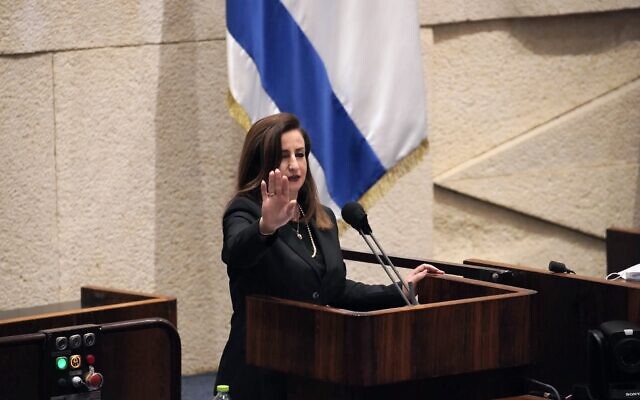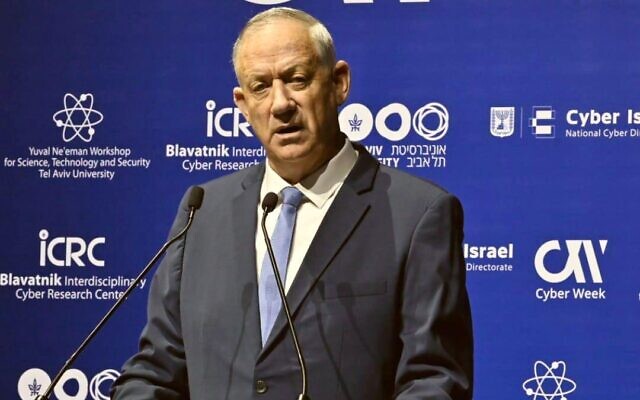Israel’s new prime minister, Yair Lapid, faces a multitude of uncertainties as the country heads toward its fifth election since 2019.
Lapid, the leader of the centrist Yesh Atid Party, took over as caretaker prime minister after he and his political partner, Naftali Bennett, dissolved the 24th Knesset after several crises. Lapid will also continue to be foreign minister.
Bennett served for only one year, breaking the record of Ehud Barak, whose term of office lasted for 20 months. He has assumed Lapid’s job as alternate prime minister until the election, after which he intends to retire from politics and turn over the leadership of his right-wing Yamina Party to Ayelet Shaked, the current interior minister.

It remains to be seen how long Lapid will retain the premiership, but he, too, may be a transitory prime minister. At the very least, he will lead the government for several months, through the election set for November 1, and into the protracted coalition talks that will follow.
If Lapid and his partners amass 61 or more parliamentary seats, he could theoretically rule for several years. But if opposition leader and former prime minister Benjamin Netanyahu manages to roar back to power, Lapid will bow out after less than six months as premier. If this should be the case, an asterisk will be placed alongside his name as Israel’s shortest-lived prime minister.
Judging by the latest polls, the fifth election could very well produce another inconclusive result and a state of paralysis in Israeli politics, with neither side winning enough seats to form a majority government.
In the last election, in March 2021, Netanyahu’s bloc of right-wing and religious parties — the Likud, Shas, United Torah Judaism and Religious Zionism — mustered a total of 52 seats, nine short of a majority.
Having failed to form a government after the fourth consecutive election, he handed over his mandate to Lapid, whose party ended up with the second largest number of seats after Netanyahu’s Likud Party.
Lapid unsuccessfully struggled to cobble together a government until Bennett’s Yamina Party, with seven seats, threw him a lifeline. Bennett, the former defence minister in one of Netanyahu’s previous governments, agreed to support his budding coalition if he was appointed prime minister ahead of Lapid.
Having struck a power-sharing deal with Bennett, they established the most ideologically diverse government in Israeli history. It consisted of a kaleidoscope of right-wing, centrist and left-wing parties: Avigdor Liberman’s Israel Beytenu Party, Gideon Sa’ar’s New Hope Party, Benny Gantz’s Blue and White Party, Merav Michaeli’s Labor Party and Nitzan Horowitz’s Meretz Party.
It was backed from the outside by Ra’am, a four-seat Arab Islamist party headed by Mansour Abbas, who broke away from the Joint List, an Arab party which declined to join the government.

Bennett’s government, apart from passing a budget, steadied the economy after the outbreak of the coronavirus pandemic, which has killed more than 10,000 Israelis and kept the country on edge and in limbo for the past two years.
Bennett, too, earmarked billions of dollars to improve conditions in Israeli Arab towns and villages.
In keeping with Israel’s quest to broaden ties with the Arab world, he deepened bonds with the United Arab Emirates, Bahrain and Morocco, three of the four countries that normalized relations with Israel under the 2020 Abraham Accords, which were engineered by the Trump administration.
As well, Bennett improved Israel’s bilateral relationships with Turkey and with Egypt and Jordan, which signed peace treaties with Israel in 1979 and 1994 respectively.

Under Bennett, Israel expanded its covert war against Iran, its foremost enemy, and lobbied against the Iran nuclear agreement, from which the United States withdrew in 2018 under the presidency of Donald Trump.
Last year, Bennett was drawn into Israel’s fourth cross-border war with Hamas, which has ruled the Gaza Strip since 2006. But since then, the Gaza border has been remarkably quiet.
The Israeli government under Bennett’s leadership launched an anti-terror campaign in the West Bank after a series of Palestinian terrorist incidents inside Israel in March and April which resulted in the deaths of more than a dozen Israelis and two foreign workers.
Bennett, in a definite shift away from Netanyahu’s policy of courting the Republican Party at the expense of the Democratic Party, reestablished Israel’s bipartisan position in the U.S. Congress. And Bennett opened up effective lines of communication with U.S. President Joe Biden.

On the negative side, Bennett — a champion of the settlement movement in the West Bank and a staunch opponent of a two-state solution — expanded Israel’s web of settlements beyond the old Green Line. And he refused to meet Mahmoud Abbas, the president of the Palestinian Authority, or to reopen peace negotiations with the Palestinians, which broke off in 2014.
Defence Minister Benny Gantz met Abbas and offered the Palestinians a range of concessions, but Israel’s occupation, a festering sore causing constant tension and bloodshed, remained intact.
After less than a year, Bennett’s government began to unravel, its ideological inconsistencies being its bane.
Amichai Chikli, a member of Bennett’s party, refused to join the coalition and aligned himself with Netanyahu from day one. Another backbencher, Idit Silman, pulled out of the government in April, complaining that it did not reflect right-wing Zionist values. With her departure, Bennett lost his razor-thin majority. Several weeks ago, a third Yamina MK, Nir Orbach, indicated he could no longer support the coalition, leaving it in minority territory.
The coalition was doubly shaken when an Arab member of Meretz, Gahida Rinawie Zoabi, bolted, and when Bennett failed to round up enough votes to extend the two-tier legal system in the West Bank.

“We did everything we possibly could to preserve this government,” he said after announcing the imminent demise of the coalition. “To my regret, our efforts did not succeed.”
As he announced its collapse, the Knesset chamber was plunged into darkness by an electric malfunction, prompting Lapid to quip, “How symbolic.”

According to the latest surveys, no single bloc will win enough seats to form a majority government. At best, the Netanyahu and Lapid camps will emerge with no more than 60 and 56 seats respectively.
Gantz has called for a broad national unity government in the event of another impasse. But he, Sa’ar and Liberman have ruled out reuniting with Netanyahu to form a new government.

Netanyahu, Israel’s longest-serving prime minister, is currently on trial after being indicted by the attorney-general on corruption charges. Yesterday, he predicted he would return to power, “retore national pride,” and “get Israel back on track to success” after the “failed experiment” of Bennett’s government.
